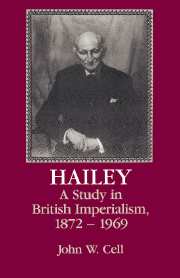Book contents
- Frontmatter
- Contents
- List of abbreviations
- Glossary of foreign words
- Preface
- 1 Early life
- 2 Colonization officer, 1901–1906
- 3 From Sargodha to Delhi, 1907–1912
- 4 Chief commissioner of Delhi, 1912–1918
- 5 A report on the Punjab
- 6 Finance member, 1919–1922
- 7 Home member, 1922–1924
- 8 Governor of the Punjab: the Sikhs, 1924–1925
- 9 Governor of the Punjab: the communal problem, 1924–1926
- 10 Governor of the Punjab: the communal problem, 1927–1928
- 11 Governor of the United Provinces, 1928–1930
- 12 Governor of the United Provinces: civil disobedience and Round Table Conference, 1930–1931
- 13 Governor of the United Provinces: 1931, year of crisis
- 14 Governor of the United Provinces: winding down, 1932–1934
- 15 Surveyor of Africa, 1935–1939
- 16 Two missions to Africa, 1939–1940
- 17 A report and a vision, 1941–1942
- 18 Adviser and propagandist, 1942–1945
- 19 Indian partition and the onset of African decolonization, 1945–1949
- 20 Defender of the faith, 1949–1969
- Bibliography
- Index
12 - Governor of the United Provinces: civil disobedience and Round Table Conference, 1930–1931
Published online by Cambridge University Press: 12 October 2009
- Frontmatter
- Contents
- List of abbreviations
- Glossary of foreign words
- Preface
- 1 Early life
- 2 Colonization officer, 1901–1906
- 3 From Sargodha to Delhi, 1907–1912
- 4 Chief commissioner of Delhi, 1912–1918
- 5 A report on the Punjab
- 6 Finance member, 1919–1922
- 7 Home member, 1922–1924
- 8 Governor of the Punjab: the Sikhs, 1924–1925
- 9 Governor of the Punjab: the communal problem, 1924–1926
- 10 Governor of the Punjab: the communal problem, 1927–1928
- 11 Governor of the United Provinces, 1928–1930
- 12 Governor of the United Provinces: civil disobedience and Round Table Conference, 1930–1931
- 13 Governor of the United Provinces: 1931, year of crisis
- 14 Governor of the United Provinces: winding down, 1932–1934
- 15 Surveyor of Africa, 1935–1939
- 16 Two missions to Africa, 1939–1940
- 17 A report and a vision, 1941–1942
- 18 Adviser and propagandist, 1942–1945
- 19 Indian partition and the onset of African decolonization, 1945–1949
- 20 Defender of the faith, 1949–1969
- Bibliography
- Index
Summary
The flame from Gujarat spread across urban India, as Jawaharlal Nehru put it, like a prairie fire. He himself received six months’ imprisonment. Early in May Gandhi delivered a challenge the government could not refuse, when he vowed to take possession of a salt works in Surat; this time he was interned under an old state prisoners act, which denied him the opportunity to make a statement in court. With the poet Sarojini Naidu leading instead, satyagrahis marched in orderly rows to the gates, where they were beaten senseless and carried away on stretchers. Witnessing the repetitions, an American newspaper correspondent felt a strange surge of anger not only against the police but against the demonstrators. In Sholapur district, Bombay presidency, martial law was declared, Bombay city was reported to be effectively in Congress hands, and Indian capitalists filled Congress coffers. At Chittagong in Bengal revolutionaries made a daring attack on an arsenal. At Peshawar in North-West Frontier Province, Indian troops at first fired on Muslim Red Shirts led by Gandhi's disciple Abdul Ghaffar Khan. Then, ominously, they refused.
In the United Provinces, where proper salt could not be made, the manufacturing ritual was farcical but, since the object was to show contempt for the government, no less effective. Liquor and foreign-cloth shops were picketed, schools and municipal buildings flew Congress flags, forest laws were broken, and Congress volunteers directed traffic.
- Type
- Chapter
- Information
- HaileyA Study in British Imperialism, 1872–1969, pp. 168 - 179Publisher: Cambridge University PressPrint publication year: 1992



